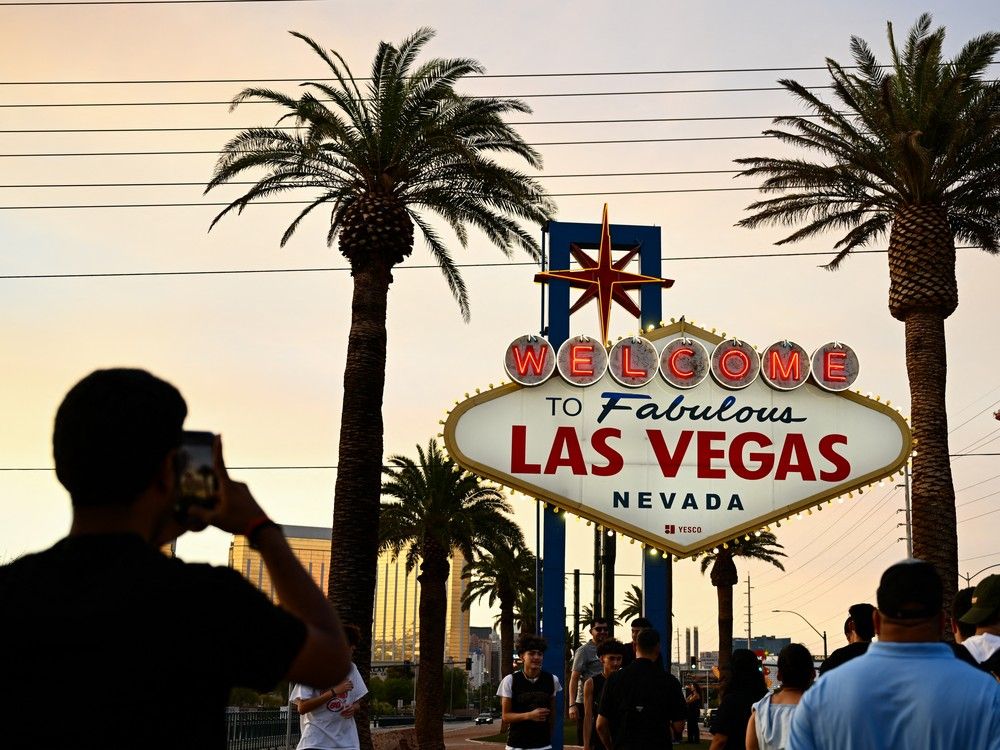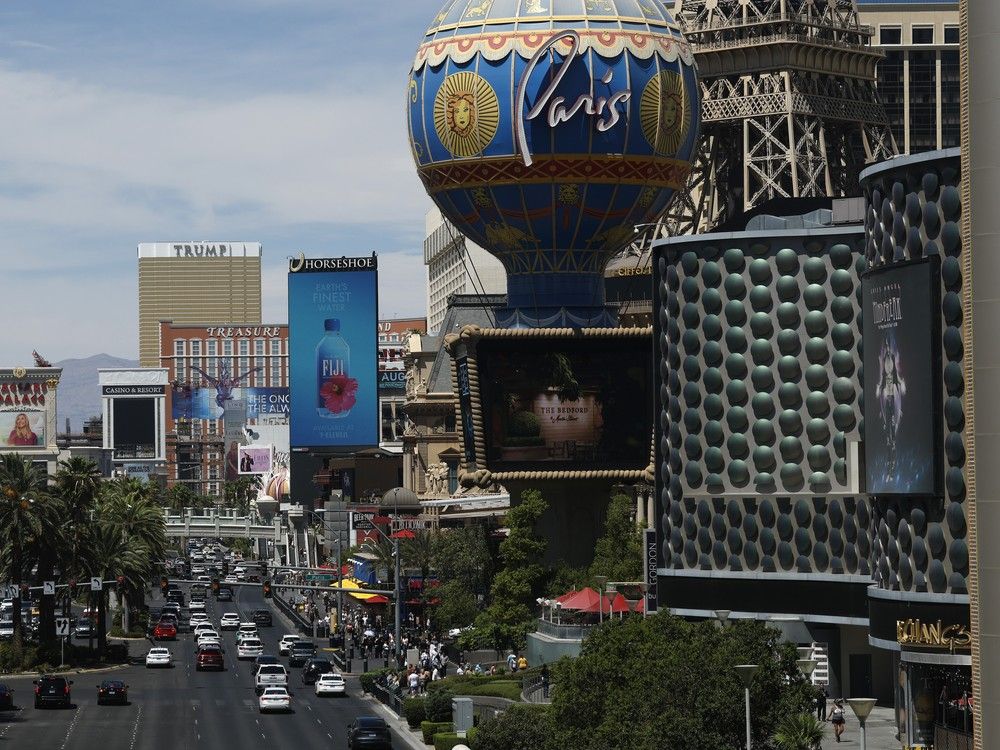
Fewer Canadians are taking a trip to Las Vegas, which is contributing to an overall decline in the city’s revenue this summer, with recent data showing a drop in visitors to resorts and convention centres.
Flight data from Harry Reid International Airport in Las Vegas shows a significant decline in Canadian tourism, which even the mayor has noted.
Compared with last June, large national carriers, including Air Canada, WestJet and Flair Airlines, have seen the number of Canadian travellers flying to Sin City
dramatically by 33, 31 and 62 per cent, respectively. Canadians are the largest group of international visitors to the city, with nearly 1.5 million
visiting Vegas last year.
Canadian air travel to Las Vegas has fallen off a cliff in 2025. Canadian visitors contributed about $3.6 billion to the Southern Nevada economy last year, according to UNLV economics professor Stephen Miller. pic.twitter.com/7MmIjzis4w
— Las Vegas Locally 🌴 (@LasVegasLocally) August 16, 2025
The city known for around-the-clock gambling welcomed just under 3.1 million tourists in June, an 11 per cent drop compared to the same month in 2024. There were 13 per cent fewer international travellers, and hotel occupancy fell by about 15 per cent, according to data from the Las Vegas Convention and Visitors Authority.
“International travel is
way down. People are not coming to the United States,” mayor Shelley Berkely told reporters last week. “We have a rather large market with the Canadians. It’s
gone from, you know, a faucet to a drip.”
Berkely said the city has also noticed a decline in high rollers coming from Mexico and that, in general, people have less disposable income.
In a statement to National Post, Berkely wouldn’t answer a question about whether she thinks U.S. President Donald Trump’s trade war is to blame for the decline in Canadian visitors.

“Las Vegas loves our Canadian visitors, and we know our city has always been a favourite for our neighbours to the north,” Berkley told the Post in a written statement. “Our tourism-based economy is not immune to economic downturns and uncertainty, but Las Vegas always bounces back bigger and better than ever.”
Stephen Miller, an
at the University of Nevada, Las Vegas (UNLV), told National Post that in 2024, Canadian tourists supported “43,000 workers in southern Nevada, which is larger than manufacturing,” an industry responsible for employing slightly over 30,000 people.
Based on his calculations, Canadian tourism to the state “contributed about $3.6 billion to the local economy.” While that economy
just over $200 billion, and Canada’s contribution may seem small, Miller said Canadian tourists are right behind bedrock institutions such as Nellis Air Force Base, a massive military installation in Vegas that the academic said added over $4 billion to the state’s economy.
“Canadian tourists are not insignificant,” Miller, the research director of UNLV’s Center for Business and Economic Research, said. He pointed to recent quarterly announcements made by “the big corporate giants in gaming,” noting that “each of them mentioned the Canadian tourist decline as a potential downside for them.”
Canadian air travel to Las Vegas down 70%. Did you know 1.3 million Canadians a year used to visit Las Vegas? pic.twitter.com/X7I7OBs1ut
— Stephen Taylor (@stephen_taylor) April 2, 2025
Concerns have been growing about slumping Canadian tourism for some time. Back in April, former U.S. Treasury deputy assistant secretary Aaron Klein told CNN that Canadian travel to Vegas was “down 70 per cent for the summer.”
“That’s a real impact there,” he continued. “It’s going to expand our trade deficit. And that’s just by telling and insulting countries, let alone with the tariffs.”
Canada was the largest source of visitors to the U.S. in 2024, with more than 20.2 million, according to U.S. government data.
Travel agents in Canada said there’s been a significant downturn in clients wanting to visit the U.S. overall, and Las Vegas in particular. Wendy Hart, who books trips from Windsor, Ont., said the reason was “politics, for sure.” She speculated it was a point of “national pride” that people were staying away from the U.S. after Trump said he wanted to make Canada the 51st state.
“The tariffs are a big thing too. They seem to be contributing to the rising cost of everything,” Hart said.
While many believe the tourism decline is being driven by the trade war and Trump’s rhetoric about making Canada the 51st state, Miller cautioned against assigning all the blame to the new administration.
“It’s a question of what people say and what they do. People say it’s because of Trump, but that may not be the real reason. I think, over time, we may find out what the real reason is,” he said, suggesting a poor exchange rate and changing tastes could also be driving some of the drop.
Ron Stagg, a recently retired history professor from Toronto Metropolitan University (TMU) focusing on Canadian-American relations, views the recent bilateral tensions as part of an evolving chapter in the story between the two nations.

“I’m not doom and gloom the way some people are,” Stagg said. ”Our relations with the United States have evolved over time, and I think this is just another evolution. It’s not going to be as dramatic as some people think, but it will help to get us to diversify our trade.”
Stagg, a
of the TMU’s history department, said the rift between Canada and America reminded him of an earlier historical period, “at the beginning of the 1930s,” when the United States raised tariffs, a move he said deepened the ongoing economic depression. The relationship began changing with the Second World War and greater cooperation between then president Franklin Roosevelt and prime minister William Lyon Mackenzie King.
“You’d have to go back into the nineteenth century, where the U.S. was actually perceived as dangerous to Canada,” he said.
Based on his conversations with everyday Canadians, he believes there is national anger “not with Americans” but “with Donald Trump and his government and (they) don’t want to give them any money.” He believes “once Trump and his cohort are gone, that it’ll (tourism) gradually return.”
Stagg sees the changing movement of Canadian travel, away from the United States and more abroad, as “one good thing Canadians are starting” to do, making citizens “more conscious of the world.”
“The U.S. will not be a friend we can necessarily count on. Still, a friend, but not one it can necessarily count on.”
National Post, with additional reporting from The Associated Press
Our website is the place for the latest breaking news, exclusive scoops, longreads and provocative commentary. Please bookmark nationalpost.com and sign up for our daily newsletter, Posted, here.
